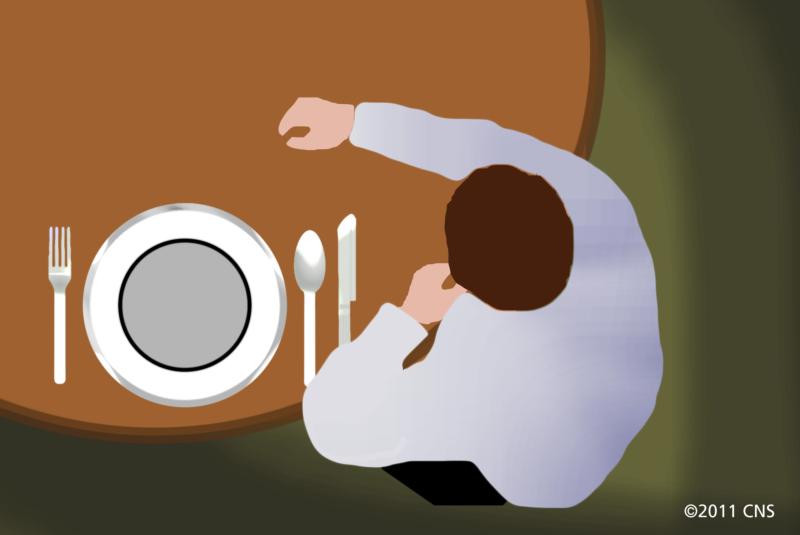
The Lenten Gospel readings encounter Jesus fasting in the desert. The Gospel emphasizes that this fasting made him hungry. Yet, he remained committed to his promise to go without. (CNS illustration/Emily Thompson)
I used to think that fasting was worthless. I would find reasons to excuse myself from the obligatory Lenten practice: low blood sugar, anemia, etc. While true, these weren’t the reasons I wasn’t fasting. I couldn’t understand how depriving myself of food made any difference in the world.
Yes, the Lenten fast is coupled with prayer and almsgiving, but I knew my prayers were heard and my donations effective regardless of how many calories I consumed. Since I didn’t think fasting mattered, for years I didn’t do it.
(See a related video.)
Now, I realize that my obstinance caused the forfeiture of opportunities for growth. Even worse, it blocked connections with God in spiritual practice and in solidarity with others. But, I didn’t go from “not fasting” to “fasting” because of this realization. I was convinced to fast because of its tangible effects on the world, and later realized the change in me.
The Lenten Gospel readings mention Jesus fasting in the desert (Lk 4:1-13). Lest we forget that in becoming fully human God fully experienced human pains, the Gospel emphasizes that this fasting made him hungry (Lk 4:2)! Yet, he remained committed to his promise to go without, which drove the devil away (Lk 4:13).
[hotblock]
“One does not live by bread alone,” Jesus explains, recognizing that the immediate, convenient, worldly temptation the devil offered would indeed stop the rumblings of his stomach but would not calm the discontent of the soul. It was not worth feeding the former if it meant compromising the latter. Through his commitment to fasting, Jesus remained committed to God’s will.
Today, our abstaining from eating certain foods or buying certain products can also help or hinder the will of God.
NBC’s popular sitcom “The Good Place” recently highlighted the reality of how much we can affect with one decision, such as buying a tomato. Good intentions of eating healthy food and feeding one’s family can be thwarted by purchases’ adverse effects.
Regarding the tomato: Farming pesticides have a detrimental effect, contaminating land via rainwater and other environmental runoff; an underpaid, migrant labor force is mistreated due to high demand for cheap product; fuel use and carbon emissions are increased by the need to transport out-of-season produce long distances using fuel-inefficient vehicles.
When faced with this reality, what are we to do? “The Good Place” resolves that we should be more understanding and forgiving in judgments of whether someone is “good” or “bad.” Increased mercy is always good, but the Gospel suggests a solution that can be even more challenging, especially in our current consumerist culture: What if we choose to go without?
[tower]
Going without doesn’t necessarily mean you cannot ever eat tomatoes again. Perhaps it means going without tomatoes when they’re not in season or going without tomatoes sometimes so that you can pay for organically grown, fair-trade tomatoes other times.
Selecting local, organic and fair-trade options helps ensure that creation — human and nonhuman — is affected positively by purchasing decisions that support sustainable practices, fair pay and just treatment. In other words, it assures decisions are in accordance with God’s will.
Fasting from a consumerist mentality that demands indulgence in immediate, convenient and inexpensive options has tangible effects. It was this realization that led me to begin the practice of fasting. In doing so, I learned how this age-old faith practice leads to change of self as well.
Whether considering food or material belongings, attention to the others affected by our decisions helps avoid the evil of selfish overconsumption. It forces us to realize that the “bread” of this world is not all that we need. Through choosing to go without, we can become more gracious for all that we truly have and experience the peace that comes with resting in God.
Due to a strategically timed Netflix series release at the start of the year, 2019 has seen individuals and families enthralled by Marie Kondo’s method of “Tidying Up.” Fascinated by the level of intrigue about which I was hearing, I watched an episode of the lifestyle show, only to find that Kondo’s teachings were nothing new.
Through a process of simplifying what one owns and expressing gratitude for what is truly needed, her clients experience order and peace. While Kondo does not operate from a Christian perspective (at least not publicly), her instruction to go without excess and express gratitude for the necessary is effective because, similar to the Gospel, it challenges the consumerist culture within which we find ourselves and asks practitioners to focus on something other than accumulation — joy.
I have abstained from eating meat for nearly two years now. I entered into this fast of abstinence during Lent 2017 and found its effects on me and the world to be so significant that I’ve permanently adopted it into my lifestyle.
Declining bacon at brunch doesn’t always spark immediate joy in my heart (as Kondo’s method would require), but it ignites joy in my soul as I’m reminded that I do not live by bread (or bacon) alone. My choices to consume or fast have lasting effects on this world, the people who live in it and the kingdom of God.
***
Stephanie Clary is manager of mission outreach and communication for the Diocese of Burlington, Vermont, and assistant editor of Vermont Catholic, magazine for the diocese.


Share this story